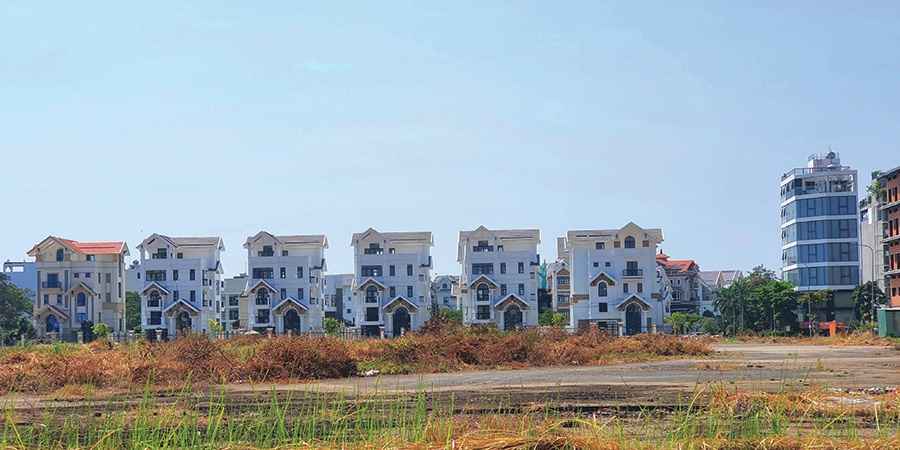Players display positivity for real estate
 |
| Homebuyers could feel more secure in returning to real estate through new legislation Photo: Le Toan |
A slowdown of the domestic economy and the tightening of credit policies has hindered real estate in Vietnam in recent times, but Nicolas Michaux, founder of Alpha Prime in Hong Kong, is quietly optimistic over near-term prospects.
“The market witnessed a decline in both supply and demand, as well as a drop in prices and rents across most segments. However, the market is expected to recover in 2024 and accelerate in 2025, thanks to the government’s efforts to stimulate the economy, improve the legal framework, and draw in foreign investment,” Michaux said.
He added that one of the key factors that would boost the market was the enactment of new laws on real estate business, housing, and land.
“These laws, which will take effect from 2025, aim to provide more clarity, transparency, and consistency in the regulations governing the real estate market, as well as to protect the rights and interests of both developers and buyers,” he added.
Some of the notable changes introduced by these laws include expanding the range of property types and real estate products that can be traded, such as mixed-use works, separate floor areas, and land use rights with technical infrastructure.
Clarifying the requirements and conditions for different types of investors in the real estate market is another outperforming issue, such as domestic and foreign individuals and organisations, and exempting some foreign-owned enterprises from the investment procedures applicable to foreign investors.
In addition, regulating the sale and purchase of land use rights, requiring the land to have existing technical infrastructure, prohibiting the sale of bare land areas, and setting out the eligibility and conditions to transfer a real estate project will all be fresh features.
“These new laws are expected to create a more competitive environment, as well as enhance the quality and efficiency of real estate projects. The sentiment from foreign investors in general for the market in 2024 is likely to be positive, as they will benefit from the improved legal framework,” Michaux added.
Meanwhile Can Van Luc, member of the National Financial and Monetary Policy Advisory Council, is optimistic that the market this year will perform positively compared to the previous two years, and will be the foundation for opportunities for growth of the market in the next period.
“With new policy mechanisms being adopted and policy penetration also starting to become clearer, the real estate market will certainly have positive changes,” Luc said.
The stance stems from factors that are considered to have a positive impact on the market’s ability to recover, according to Luc. The economy in 2024 is forecast to grow more positively; interest rates are on a downward trend; aforementioned new laws have all been approved; capital sources for the market will be more abundant; and the bond market has recorded a recent increase in issuance volume.
According to the Vietnam Association of Realtors (VNAR), the adoption of the amended Law on Land (LoL) is an important turning point, expected to revive the real estate market, resolve legal issues, create better conditions for investors, and contribute to the development of the real estate market in a transparent and sustainable direction.
“The new regulations in the new law have a basis to apply in practice and change the market. For now, the LoL 2024 will contribute to increasing confidence and helping homebuyers feel more secure to return to real estate,” said Van Binh, deputy chairman and general secretary of the VNAR.
However, Dinh Minh Tuan, a director of Batdongsan.vn, said that the amended land law should not be expected to help the market to recover quickly.
“I think we need 8-12 months for the law to be absorbed and implemented. That is also the reason why it was passed so early, so that over the next year, market participants can discuss, understand, and prepare,” Tuan said.
Hoang Huu Minh Dung, head of Research and Development at BHS Group, said that housing demand, especially in Hanoi and Ho Chi Minh City, remained high.
“While waiting for the new law to be promulgated, it is difficult for projects to be approved for sale, so the supply of new residential real estate is still limited. The projects that will be open for sale are mostly old projects,” Dung said.
Statistics from BHS Group said that in 2024, about 183,000 high-rise apartments in the both cities would be open for sale. Another 70,000 low rise housing units will be opened to the market this year, mostly in Haiphong, Hung Yen, and Hanoi in the north. In the south, Long An and Dong Nai are leading the market, followed by Ho Chi Minh City.
“Thus, the real estate market will still have a chance to recover in 2024. However, the signs of a full recovery will be most clearly shown in 2025, when the amended laws come into practice,” Dung said.
| Le Van Hoi, director, My Way Law Firm Tightening the division of plots and selling plots and being allowed to receive a deposit of up to 5 per cent of the selling price for the sale of houses formed in the future are outstanding issues in the revised Law on Real Estate Business (LoREB). If the 2014 LoREB does not allow project investors to authorise cooperation parties to sign real estate purchase, transfer, or lease purchase contracts, the amended LoREB does not allow the signing of a deposit contract. This regulation partly comes from the addition of a regulation allowing real estate project investors to receive a deposit of no more than 5 per cent of the selling price. However, it also closely attaches the investor’s responsibility in continuing to receive deposits, proceeds from real estate sales and transfers directly from customers. The 2014 law does not contain the receipt of deposits from investors for real estate products formed in the future. The revised LoREB clearly notes that real estate project investors are allowed to collect a deposit of no more than 5 per cent of the selling price, lease-purchase price of houses, construction works, and construction floor area in construction projects from buyers when the housing and construction projects have met all conditions for being put into business according to the provisions of this law. To protect the rights of buyers, the amended LoREB continues to tighten conditions for real estate put into business. The regulation stipulates that the project investor must fulfill all of his obligations on land finance including land use fees, land rents and taxes, fees and charges related to land (if any) for the state according to the provisions of law for land attached to housing, construction works put into business. Thus, when before putting future real estate products into business, investors are required to complete financial obligations regarding land. Le Hoang Chau, chairman, Ho Chi Minh City Real Estate Association The amended land law specifies over 30 cases where the state reposes land for socioeconomic development for national and public benefits and regulates cases of land recovery to implement projects and works for national benefits, ensuring openness, transparency, and ease of monitoring. It also outlines local cases of widespread land acquisition as happened before. It also stipulates strict regulations on compensation, support, and resettlement when the state repossesses land to ensure the legal and legitimate rights and interests of individuals whose land is recovered. In particular, it determines the principles of compensation, support, and resettlement when the state recovers land, including the principle that the resettlement area must complete the conditions of technical infrastructure and social infrastructure at the same time. At the same time, it must be consistent with the cultural traditions and customs of the community where the land is recovered and the approval of compensation, support, and resettlement plans must be completed first. Jason Turnbull, CEO, Inspire Advisory Group Vietnam The amended Land Law will increase competitiveness in foreign investment for Vietnam. This amended Land Law has resolved important issues related to determining the starting price when organising auctions of land use rights, setting out the principle that land prices must be based on legal and use purposes at the time of valuation, according to the land use term, in accordance with the prevailing land prices on the market for land of the same use purpose. This gives foreign investors the assurance of market stability, creates a fairer environment for foreign investors to use real estate, and in turn will make Vietnam an attractive destination for foreign investors. |
 | A new property market cycle is beginning for Vietnam The new Land Law should promote market mechanisms, regulate interest groups, put people first, and minimise disparities between real estate businesses. |
 | More attention likely in housing ownership The National Assembly passed a new Law on Housing and new Law on Real Estate Business last November. Anh Le, managing partner at DN Legal, analyses a number of legal changes related to housing ownership of foreigners in Vietnam. |
What the stars mean:
★ Poor ★ ★ Promising ★★★ Good ★★★★ Very good ★★★★★ Exceptional
Related Contents
Latest News
More News
- More than $40 billion investment recorded in Asia-Pacific commercial real estate (February 18, 2026 | 19:58)
- Keppel co-hosts Home Hanoi Xuan festival in Hanoi (February 14, 2026 | 09:00)
- Saigon Centre gains LEED platinum and gold certifications (February 12, 2026 | 16:37)
- Construction firms poised for growth on public investment and capital market support (February 11, 2026 | 11:38)
- Mitsubishi acquires Thuan An 1 residential development from PDR (February 09, 2026 | 08:00)
- Frasers Property and GELEX Infrastructure propose new joint venture (February 07, 2026 | 15:00)
- Sun Group led consortium selected as investor for new urban area (February 06, 2026 | 15:20)
- Vietnam breaks into Top 10 countries and regions for LEED outside the US (February 05, 2026 | 17:56)
- Fairmont opens first Vietnam property in Hanoi (February 04, 2026 | 16:09)
- Real estate investment trusts pivotal for long-term success (February 02, 2026 | 11:09)

 Tag:
Tag:


















 Mobile Version
Mobile Version